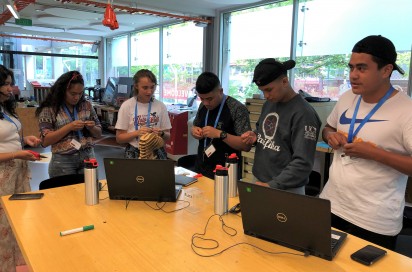DiscoveryCamp and NanoCamp
10 August, 2020
 Every year, a group of New Zealand’s brightest year 12 and 13 secondary school students spend a week at NanoCamp and DiscoveryCamp. The camps are hugely popular and attract many more applications than there are places available. The five day, all-expenses-paid residential programmes give students a hands on opportunity to experience science under the guidance of New Zealand’s top nanoscience and advanced materials researchers.
Every year, a group of New Zealand’s brightest year 12 and 13 secondary school students spend a week at NanoCamp and DiscoveryCamp. The camps are hugely popular and attract many more applications than there are places available. The five day, all-expenses-paid residential programmes give students a hands on opportunity to experience science under the guidance of New Zealand’s top nanoscience and advanced materials researchers.
The MacDiarmid Institute DiscoveryCamp – Te Tohu Huraina - is now in its 11th year, giving Māori and Pacific Island students with a passion for the sciences a chance to enhance their scientific knowledge and help them carve out a potential career in science and technology. Hosted by our researchers, the camp gives these students an experience of the university environment beyond taught coursework.
Entering into the university environment can be alienating for Māori and Pacific Island students; connecting the students with researchers and with university communities that provide support has proven successful. DiscoveryCamp alumna Mariah McDonald (Ngāi Tahu, Tuahuriri) graduated with a degree in Engineering, and she is now studying for her PhD in Biomechanical Engineering. She attended the camp in her final year of high school and said this allowed her to try out different things and helped her discover what she wanted to study.
Māori and Pacific Island peoples continue to be under-represented across science and technology in New Zealand, so DiscoveryCamp intervenes early. To help with the transition in education, high school students are given a valuable opportunity to become familiar with university life, by attending lectures and living in residential halls.
Instead of feeling frustrated over these statistics, DiscoveryCamp alumnus Eden Skipper (Ngāi Tahu) said he used this as motivation to achieve great things. After completing a Bachelor of Science with Statistics, Eden says he encourages high school students to not be afraid to go to university, even if they are only one of a few Māori and Pacific Island students in their class.
The camps took place between 12th and 17th January 2020, and this year were located at two different locations: University of Auckland and Victoria University of Wellington. The camp programmes included such diverse activities as visits to nanoscience laboratories, hands-on activities in the fields of biosensors and microfluidics, preparing and delivering videos and excursions to Zealandia, Weta Workshop and Tiritiri Matangi Island.
We hosted 48 students across the two locations: NanoCamp – University of Auckland – 15 students (hosted by Associate Investigators Dr Erin Leitao and Dr Michel Nieuwoudt), NanoCamp – Victoria University of Wellington – 15 students (hosted by Associate Investigator Dr Guy Dubuis), DiscoveryCamp – University of Auckland – 8 students (hosted by Principal Investigator Associate Professor Geoff Waterhouse) and DiscoveryCamp – Victoria University of Wellington – 10 students (hosted by Associate Investigator Dr Nathaniel Davis).
The Wellington-based students particularly valued getting the opportunity to visit Te Papa in Wellington and see behind the scenes with one of their scientists, as well as getting the opportunity to attend a PhD panel and listen to current students speak about their own academic experiences. In Auckland, camp attendees appreciated getting to hear from MacDiarmid Institute alumna, Dr Michelle Dickinson (‘Nanogirl’), the sessions on solar cells and learning about 3-D printing.
A week full of new friends, amazing mentors, fascinating learning and great social activities, I couldn’t have asked for a more awesome trip to be a part of.
DISCOVERYCAMP PARTICIPANT


